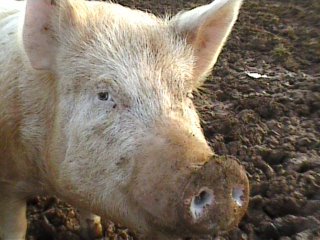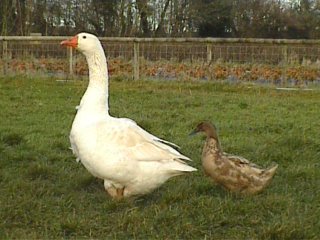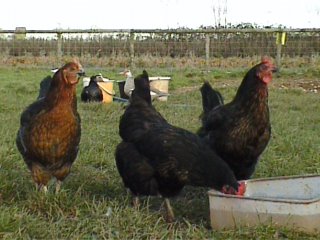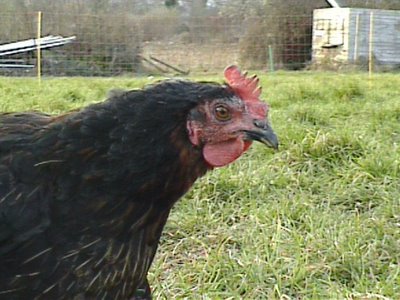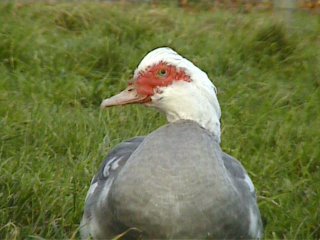Keeping Chickens at Home - Getting started.
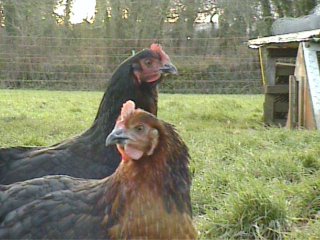 'Keeping Chickens at Home'
'Keeping Chickens at Home' is for anyone who simply wants to learn how to keep a few chickens in their back garden and just wants the basics explained to them in a simple to understand manner.
You don't need acres of land to keep a few chickens. In fact I kept three very happily living only a mile from an UK city centre.
If you and the kids want a new (and I warn you now....addictive) new hobby or you just want to stick up two fingers to chicken battery farming and produce your own organic free range eggs, keeping chickens is the easiest way to start raising your own livestock and begin the 'Good Life'.
Unfortunately, chickens and pigs still get a very raw deal when it comes to farming standards and practices. Things are getting better, but we're still a long way off. Free Range doesn't mean anything any more as EU standards are still too low.
If you're interested in how livestock are really kept in the UK and how you can help (apart from
keeping chickens at home) go to
www.ciwf.co.uk They campaign for the improvement of intensively farmed animals. Some of the details and images you may find upsetting. I actually hope you do get upset and angry. I know I did when I first saw how animals are being kept in this country. But do something about it and influence your family and friends. Try to buy organic meat whenever possible. I know it's more expensive, but hey, eat less meat and you can then afford it. You won't go back after you've tasted it. And you know the animals are being properly looked after.
As well as posting articles on
'How to Keep Chickens', I will also pop in the occasional post and pictures of my other animals at my Smallholding in Devon, UK. I currently have chickens, ducks, geese and pigs.
Let's get something straight though, I don't pretend to know everything about
keeping chickens. I'm still learning every day, even after years of doing it. I simply want to share the tried and tested methods I use for
keeping chickens that have worked for me. God knows, I've made lots of mistakes, but hopefully, I can show you how to avoid the worst of them.
So if someone posts a comment or question you know the answer to, don't wait for me to reply. Get in there and share your experience and knowledge with everyone. Let's face it, the 'forum' aspect is always the most useful, as it answers the problems you have now.
So, if you've always fancied the idea of
keeping chickens, the very first things you have to ask yourself is Why? and Where?
Why do I want to keep chickens?There are obviously loads of different reasons ranging from wanting a fresh, free-range egg every morning to just enjoying having chickens scratching around your garden, softly clucking when they find an interesting titbit. This normally results in every other chicken suddenly wanting it and a game of 'catch' breaking out! One chicken will get the desirable morsel (in reality probably just a leaf or something...they are not the brightest creatures in the World!) and every other hen will chase it until one of them gets it. Then it's their turn to run and so on until they lose interest or just forget what they're doing.
I think it's important you just get it clear in your head now why you want to
keep chickens, because, as with keeping any animal, they will be totally dependant on you for everything. Chickens are for life not just for Xmas!!!!!
As I stated earler, I started
keeping chickens when I found out how battery hens were kept and I knew I could never support such cruelty to animals. But when I tasted the first egg from my first hen, I was hooked. The white was somehow thicker and denser. The yolk looked like I added yellow colouring. In fact, when I made scrambled eggs for some friends, they thought I had added something to it. It was so yellow. I could never go back to shop bought eggs. Even the free-range organic supermarket versions pale in comparison with the eggs laid every day from my girls.
Chickens are not the most cuddly of animals to be sure, but they are, without doubt, one of the most interesting and amusing to watch. Their antics and routines are a sight to behold. Try and watch a hen come running across the garden towards you when it's feed time without a smile on your face. It's like a fast waddle with the odd skip and flap thrown in for good measure.
They have loads of character and are easily trained. They will quickly learn to feed from your hand, allow you to pick them up for a stroke and a 'wattle rub' (It's nothing kinky, but the chickens enjoy it! ;-) I think watching a chicken have a 'dust bath' is one of the funniest things around. Especially when the hole is deeper than they are. It's like a scene from 'The Great Escape'. After they finish, they wander off, stop and have a final flap emitting a huge dust cloud. In case you're wondering, a dust bath is exactly that. An area of dry earth where the chickens can flick dust onto themselves in order to keep down parasites.
If you're already thinking 'wattle-rub, dust bath - what is he talking about? Don't fret, all will be explained later. Just make sure you come back to learn a little bit more about keeping chickens and to see how all the animals are doing at my smallholding.
Where can I keep chickens?The answer is anywhere you are allowed to. There may be certain local regulations not allowing the keeping of poultry in your neighbourhood. You need to check with your local authority to make sure. Having said that, as long as you have a friendly chat with your neighbours, no ones going to even know you got them (As long as you don't keep a cockerell that is! Your neighbours may not like being woken up at 4am with his energetic crowing).
By the way, you don't need a cockerell (That's a male chicken for the complete beginners out there) for hens (female chickens) to lay eggs. They are perfectly happy and will lay as many eggs without a man around. How many woman out there are now thinking "Lucky things!!". It's the ultimate in 'Girl Power'.
We will go into the types of housing for chickens later on, but a space of about 6ft x 4ft is needed to keep 3-6 hens. Their accommodation consists of a sleeping and laying area (which is covered and protects them from the elements and a covered 'run' area. This is where they spend the day scratching around. 'Scratching' is when the chicken uses it's feet to scratch the ground looking for bugs to eat.
Ideally their house will need to be portable, so that it can be moved over fresh grass every day. You can also have a permanent hen house and alternate the areas of grass they use with the use of a fence. It's important to change or rotate the area they use, otherwise they will soon scratch it up and it will be bare earth in a very short time. Keeping any animal on the same ground for a long time is not a good idea as parasdites will soon start to build up and cause health problems.
Even though it's what they naturely prefer, you don't have to keep chickens on grass at all. You can put them on a thick layer of straw or woodchips. Change it every four weeks and you will not only get great eggs, but you will also have the best compost for miles around.
Whichever route you decide to take, the most important thing of all is to make sure the chickens are treated with care and respect. They must have a dry, comfortable and safe place to sleep, a dark and clean place to lay their eggs, access to food and fresh water and a safe and sheltered outdoor area to spend the day.
Keep these things in mind and you will raise the happiest chickens in the world. And in return, they will keep you amused and provide the best boiled egg and 'soldiers' you've ever had in your life.
Bye for now and don't forget to come back as I'll be adding new posts and pictures.
Pete.
Keeping Chickens at Home
